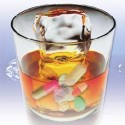Medical director: It's all in the brain
Managers may not be able to increase productivity by giving their employees serotonin — well, legally — but they can boost production by making the work area a little more brain-friendly.
Daniel Amen, the medical director of Amen Clinics, focuses on making brain theory function in the day-to-day grind. His audience at California State University, San Marcos on Wednesday was not pre-med students — they were aspiring businessmen and women.
By understanding the brain, Amen said, one can become more focused in their own lives and as managers. By understanding how the brain works, a manager can figure out how to help his employees.
“I think if you are going to study business, you have to study your brain,” Amen said.
For example, procrastinators respond well to goal setting. Those with low motivation can get the boost they need from smelling lavender.
“When your brain works right, you work right,” Amen said. “When your brain doesn’t work right, you have trouble.”
Amen said doctor’s orders to exercise and eat healthy aren’t a joke. By taking a 30-minute brisk walk a few times a week, one can improve brain health dramatically. Eating vegetables gives the brain energy to operate. Staying away from alcohol, Nutrisweet and caffeine keeps the brain healthy.
“The worst food you can have in your body is Diet Coke,” Amen said, noting to the room full of college students that coffee isn’t great either. In 2007, the National Coffee Association found that 37 percent of coffee drinkers were 18- to 24-year-olds.
Amen, the New York Times best-selling author of “Change Your Brain, Change Your Life,” recommended taking fish oil supplements. The Omega-3 fatty acids are known to decrease the risk of brain problems, like Alzheimer’s disease. Amen said health benefits are endless with the supplements; they also help the heart, the skin and hair.
The Amen Clinics have performed more than 43,000 SPECT brain scans — different than an MRI because Amen’s looking at a brain’s function. He compared it to looking at a car’s engine. An MRI or CT scan looks at the engine’s parts and a SPECT scan looks at how the engine is working.
The thousands of scans have shown trends in personality traits, disorders and actions. For example, those with attention deficit disorder have similar brain scans. The same is true for drug addicts, smokers, alcoholics and murderers. Amen trusts the technology so much that he doesn’t let a man date his daughter for more than four months without a brain scan.
“People who drink everyday have a smaller brain, and I would just suggest to you that when it comes to the brain, size matters,” he said.
It’s one thing to know that drinking alcohol is bad for your brain. However, when Amen showed brain scans and how they affect cognition, a light bulb turns on.
At CSUSM, Amen simplified neuroscience by dividing the brain into three parts — the prefrontal cortex, deep limbic system and the anterior region — and explaining how disorders in each part affect a person.
The prefrontal cortex affects forethought and judgment. Problems with the prefrontal cortex can cause a person to have a short attention span, lack empathy and to procrastinate. To help that, one should set goals, exercise and eat more protein. A person with a weak prefrontal cortex who eats carbohydrates can see their symptoms get worse.
The deep limbic system affects emotions and smell. People who have problems with the deep limbic system can have depression and low motivation. To improve the deep limbic system’s health, one should meditate while thinking positively and smell lavender.
Those who tend to be oppositional thinkers, who struggle with holding grudges and get stuck while processing thought, may have a weak anterior region. By shifting their attention and eating more carbohydrates, they would be able to process thoughts better.
“Think about it. Your brain runs everything from the stock market to the local market,” Amen said about why one should keep the brain healthy.
__________
source: San Diego Source/Daily Transcript

